The Crisis in the Middle East is a Crisis of Growth
by Daniel Wortel-London
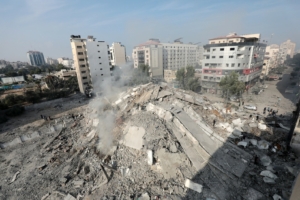
The destruction in Israel and Gaza results in part from struggles over growth and natural capital. (Wafa, Creative Commons 3.0)
The catastrophe unfolding in Israel and the Gaza Strip is the product of many factors, including colonialism and religious fanaticism. But another impulse driving this disaster deserves discussion: competition over growth and the natural capital—particularly energy, water, and land—that ensures it. These resources provide the basis for economic and population expansion in the Middle East and elsewhere. As nations continue to recklessly pursue this expansion in a finite world we will see more and more struggles over fewer and fewer resources. For the sake of peace as well as planetary health, therefore, we must end the growth obsession that has plunged our planet into chaos.
Energy
We cannot understand conflicts in Israel/Palestine, and the Middle East more broadly, without attending to the geopolitics of energy. Israel is a growing economy—its GDP expanded by 8.6% in 2021. Much of this growth is fueled by natural gas and oil—and sizeable reservoirs of these resources have been discovered in the West Bank and the Gaza Strip. The Israeli government, however, prevents Palestinians from exploiting this wealth. This breeds both poverty and animosity among the Palestinians. To highlight one statistic: While the per-capita GDP of Israel is $42,100, that of Gaza is only $5,600. Israel’s extractive-based economic growth—and its refusal to redistribute the fruits of that growth to the Palestinian territories which enabled it—thus contributes to the political tensions of the region.
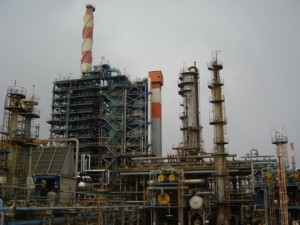
Oil is driving growth—and instability—in the Middle East. (Avishai Teicher, CC).
But struggles over energy also lie behind the actions of large nations outside of Israel—actions that are contributing to the region’s instability. China, the world’s largest energy consumer and its second-largest net oil importer, has been investing heavily in trade agreements with Iran, a hated enemy of Israel. Russia has also been courting and purchasing oil from Iran, contributing to the nation’s $19 billion dollars’ worth of crude oil exports in the first quarter of this year. As China and Russia pursue their growth paths, they will purchase growing quantities of oil from other Middle Eastern countries, with much less commitment to Israel’s survival than the United States has. The result is that the politics of growth—and its energy requirements—is helping to isolate Israel geopolitically.
The USA, of course, is not innocent in these matters. For decades, one of the its key interests in the Middle East has been to secure a stable source of oil for its domestic growth. This pursuit has led the United States to support corrupt and tyrannical regimes in the region, such as Saudi Arabia. This in turn leads to inconsistencies and tensions between the U.S. policy of support of Israel and its support of countries that despise Israel. The contradictions are ultimately unsustainable. To be sure, the USA’s “Shale revolution” of recent years has made the country more self-sufficient in terms of hydrocarbon. But this has only increased the role of China and Russia as market partners of Middle-East oil exporters, which bodes ill for Israel.
Water
Water is essential for economic and population growth. Israel has seized control over this vital form of natural capital within Palestinian territories. Eighty-five percent of Palestinian water from West Bank aquifers was taken by Israel as late as 2004, accounting for 25.3 per cent of Israel’s water needs. Palestinians are also denied the right to utilize water from the Jordan and Yarmouk rivers. The result is that water consumption by Israelis is at least four times that of Palestinians. And the result of this is increasing anger on the part of Palestinians.
Israel has also eroded Palestinian capacity to access natural capital. In May 2021 Israel’s military damaged water and sewage infrastructure, even as it slowed or blocked importation of repair parts. As a result, tens of thousands of cubic meters of sewage are flooding into groundwater and the Mediterranean Sea. According to the World Health Organization, 97% of Gaza water is “unfit for human consumption,” largely due to damages caused by Israel’s military operations.
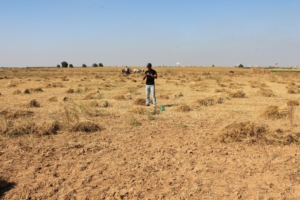
Water—and lack thereof—is another source of geopolitical instability in the middle east. (Joe Catron, CC)
Israel has also siphoned off Palestinians’ natural and human capital for its own growth. Palestinian territories have been locked in a cycle of colonial underdevelopment for decades: Since 1967, Palestinians have lost access to two thirds of their grazing land. In Gaza, half of the cultivatable area and 85 percent of fishery resources are inaccessible to Palestinians. The result is that Palestinians are stuck with terms of “unequal exchange.” Sixty percent of Palestinian trade goes to Israel, and up to 40 percent of the total Palestinian labor force has worked in Israel at some point over the past 50 years. Such a policy replicates, in miniature, the broader dynamics of the global North/South division: reduced labor costs for the former (in this case, Israel), underdevelopment and resentment for the latter (the Palestinians).
Population
Finally, Israeli policies and spiraling Palestinian birthrates have exacerbated competition over another source of natural capital: land for living space. The Gaza Strip, at 139 square miles, is approximately equal in size to the city of Philadelphia. But the Gaza strip has about one-third more people than Philadelphia, and its densest parts have roughly 10 times as many people as Philadelphia’s most populous neighborhoods.
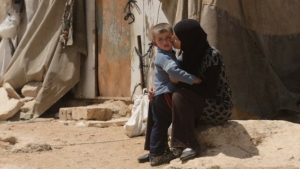
Population density is adding to the Gaza Strip’s woes–and anger (Libertinus, Creative Commons).
A similar kind of density is evidenced in the West Bank, where Palestinians are concentrated in hundreds of tightly-patrolled zones. Such density, in addition to poor sanitation, contributes to higher mortality rates. Where the average lifespan in the West Bank and Gaza is 73.2 years for males, it is 78.1 years for Israeli males.
Growing populations only increase this competition for space. The median age for Palestinians in Gaza and West Bank is 18, as compared to the global figure of 28 (and 38.1 in the USA). The fertility rate for women in Gaza is 3.34, relatively high by global standards. The reasons for this are complicated. But the result is increased crowding and pressure on resource consumption—resources which grow ever more scarce.
Conclusion
The catastrophe we are witnessing in the Middle East is the product of unique tensions and hatreds dating back hundreds of years. But it is exacerbated by the pursuit of growth, a pursuit driven by greed, competition, and the simple need to survive in a world that seems unable to find other ways to provide for human needs. As long as growth remains the goal of our economies, we will see more conflicts like we are seeing in Israel—everywhere.

The more we grow, the more we fight. (Ted Eytan, Creative Commons)
But it doesn’t have to be this way. There is already enough wealth in the world to end extreme poverty seven times over without struggling over our planet’s dwindling resources. We have what we need. To get there, however, all nations must awaken to our responsibilities to redistribute and use our wealth and natural capital in a way that is just and sustainable. As one activist in a joint Palestinian-Israeli climate group has stated, “Everyone here is fighting over land,” adding that unless the resort to violence ends, “there won’t be any land worth living on left.”
Daniel Wortel-London is a Policy Specialist at CASSE.


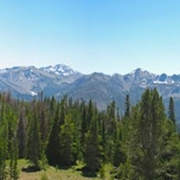

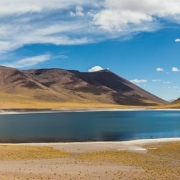
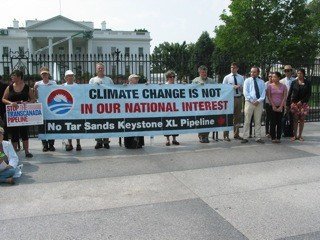



Reading this article’s section on water, and the links therein, I can understand why Bishop Desmond Tutu called Israel’s version of apartheid even worse than that of South Africa. Israel’s prestigious human rights organization B’Tselem has done detailed documentation on the water issue. https://www.btselem.org/topic/water
I wonder if growth and colonialism go hand in hand, or maybe that economic growth depends on neo-colonial relationships.
There is a whole line of analysis of that question in the literature on imperialism, capitalism, and economic growth. A good overview is John Bellamy Foster and Brett Clark’s book, The Robbery of Nature. The short answer is yes to both alternatives you pose. The capital accumulation the underlies economic growth depends on both the expropriation of nature (seize a natural resource and turn it into capital) vía colonialism and the classic exploitation of workers and caregivers. In the current context, this dynamic is even more vicious as nations and the firms they represent compete for control over resources that their competitors need. This dynamic is primarily manifest in the global geopolitical aspect of the conflict. The situation on the ground in the conflict between Israelis and Palestinians, however, is also tied to the ethnic cleansing that the attempt to establish a Jewish state on land that is already occupied. In this sense, there is also an ideological aspect to colonialism that is fueled by more than the growth imperative.
Amen, Daniel. One would think it’s pretty obvious that dry regions with poor rocky soil just can’t support that many people. My mother, in a visit to Israel in the 1970s (neither she nor I have any cultural or ethnic connections to Israel, she was just a curious sightseer) mentioned that for a place so keenly contested… it was quite desolate and undesirable, really.
All I can add is that it’s extremely unfortunate that in that part of the world – and many others – fervent nationalists hold onto the view that “population is power.” Alas, even wars are won by quality now, not masses of illiterate men charging each other in a battle of numbers. But this they cannot see. Sigh.
It’s not just about having more fighting men (or women). When you are or feel threatened with extermination, surviving and breeding is the instinctual response. When your enemy wants your survival or safety, and you have no other recourse, you hurt yourself (such as in a hunger strike when you are a prisoner); when your enemy wants you gone, you survive and breed.
A just solution to this long-lasting conflict could also help lower the unsustainably high birth rates of this area. As for why so many people fight over it, I think it’s because it has the holy sites of three major religions. And also because people don’t like to be told to leave their home to make room for someone else, of course.
I apologize up front for making this comment personal, but there comes across a very strong anti-Israel bias in this article, and anyone who states that the world’s poverty can be solved seven times over cannot, I think, be taken seriously.
Hi Barry,
Thank you for your comment. I’m sorry that you see an anti-Israel bias in this piece. I wasn’t intending that, as I was mostly focused on drivers of resource consumption within the area. I would welcome your feedback on any errors of commission or omission you found in this piece. As for the statement on poverty, I encourage you to fact-check the original Oxfam source where I got my statement from to let me know if they and I missed anything. https://d1tn3vj7xz9fdh.cloudfront.net/s3fs-public/file_attachments/bp-reward-work-not-wealth-220118-en.pdf
It’s a list of facts; if you detect an anti-Israeli bias, it might be because Israel isn’t behaving very well. Sometimes criticism is justified, and the author wasn’t even explicitly criticising.
One of the provocations has been new Israeli settlements and expansion in Jerusalem. The ultra-orthodox Heredim, initially a very small minority, have one of the highest fertliity rates in the world–8 children per woman. They are the expanding population going into the settlements. This really is about too many people competing for too little space. Yassar Arafat, the Palestinian leader said, “The Palestinian womb is our best weapon.” And hard line Israelis have also said outbreeding the other side would increase their power. Pretty clear where this leads. Add the “eye for an eye, tooth for a tooth, life for a life Biblical laws.” Both side’s religions agree on that. An endless cycle of death and misery.
Unending population growth via immigration and high fertility rates has been a key issue since 1948 that has been mostly ignored by the mainstream press as well as by academics, politicians and others.
Essential reading is Alon Tal’s book “The Land is Full: Addressing Overpopulation in Israel.”
https://www.amazon.com/Land-Full-Addressing-Overpopulation-Israel/dp/0300216882
I expect the eye for eye tooth for tooth, life for life and life for life laws you mention are a minimal mention within their largely respectful religions. It has been the decades of injustice and division that have led to this ongoing violence.
Similar to the Irish 600 year conflict solved by talking, identifying and addressing the injustices while envisaging a truly fair and equal way forward. If this can somehow be envisaged in that region.
In 1948 when Israel was established modern best practice on avoiding and resolving conflict wasn’t available or perceived as necessary, so it wasn’t in the constitution. That’s no ones fault who is living now. Blame needs to be set aside with the people there working out how to win an enduring fair peace. Its their lives that are being destroyed. If they can somehow not take divisive influence from other regions that may not have all of the regions peoples interests at heart.
First off, the narrative of Israel as a “settler-colonial” enterprise is just wrong. If one believes at all in Indigenous Rights one must acknowledge that Jews are the Indigenous People in Israel, which is their ancestral homeland. Let’s not forget that Israel gave up the Sinai, with some three times the land mass of the entire state of Israel, for peace. Let’s not forget the numerous overtures of “land for peace” that have been continually rejected by the Palestinian leadership over the decades.
I’m not sure that framing the Israel-Palestine conflict through the prism of the steady state economy makes much sense in and of itself, but considering Israel-Palestine without looking at the larger region (including the extractive wealth that allows Qatar to fund Hamas, Al Qaeda, Hezbollah, the Taliban, Isis, the Muslim Brotherhood, etc. and also fuels national investment funds in Qatar and other Gulf States that themselves seek growth and power through worldwide investments seeking economic growth) makes even less sense.
Instead of blaming Israel for poverty in the Gaza strip, how about considering the extreme wealth in neighboring Arab countries and the billions of dollars Qatar and other nations funnel to Hamas, which could be used for the welfare of the residents of Gaza rather than for weapons, tunnels, and pensions for the families of Jew-killers?
Ultimately, the crisis in the Middle East for Israel is existential. All the wars in Israel’s 75 years have been existential. The crisis is about Israel’s survival as a Jewish state in the ancestral homeland of the Jewish People. In a world of extreme anti-Jewish racism, which like a pathological virus surfaces time and again at the seeming drop of a hat, Israel is what separates Jews from millennia of pogroms, persecution, and genocide. At least for many Jews, it is not at all about growth.